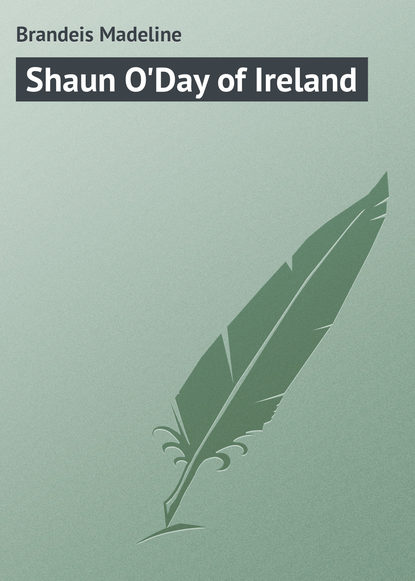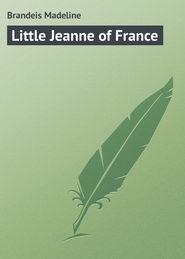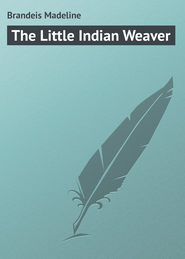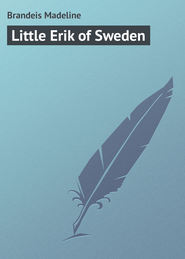По всем вопросам обращайтесь на: info@litportal.ru
(©) 2003-2024.
✖
Shaun O'Day of Ireland
Настройки чтения
Размер шрифта
Высота строк
Поля
This is what it said:
"My Dawn O'Day —
"At last I am leaving the fairy folk. My fingers have grown too clumsy and my arms too big for the dainty likes of the Good People. Those elves, the children of this bright world, do not be wanting Shaun O'Day any more.
"And so, little Eileen, I am coming back to you and Ireland. And in my pocket is silver and gold to buy us a wedding and a cottage.
"But the cottage will not be in that New Island. 'Twill be in the old Emerald Isle.
Your Shaun."
Shaun sold everything he had but an old suit of clothes. He bought a ticket on a boat going to England and sailed away from New York.
As the big ship left behind her the great American city, the Irish lad saluted and murmured, "Farewell, fairyland. 'Tis too grand you are for the likes of a simple lad like me. But, och, a wonderful, great fairyland you are!"
Slowly the stately harbor disappeared from view.
PART II
CHAPTER VI
JOHN
"Come cuddle close in Daddy's coat
Beside the fire so bright,
And hear about the fairy folk
That wander in the night."
– Robert Bird
It is to-day in Ireland. Shaun O'Day is married to Eileen. He has made her his Dawn O'Day.
They have built a cottage near the banks of that blue Irish lake. They live there with their children.
Shaun and Dawn O'Day have three children. Their youngest is a red-haired baby girl with the eyes and the name of her mother.
Their oldest is a lanky, freckle-faced lad who wears the cast-off trousers of his father. No more do tall boys wear the petticoats of girls. They are not afraid of the leprechaun when they reach the age of ten or twelve years.
But their mothers still keep them dressed as girls when they are small. And that is why we find John, the second son of Shaun O'Day, in a red petticoat. He looks very much the way Shaun himself had looked at that age.
John had been christened Shaun. But they call him John, because it is to-day in Ireland. Young Shaun was called John O'Day.
John had the ruddy complexion given most of these village lads by the wind and rain. But he was not as tough and strong as his father had been. He did not have to work. He could come home from school and do as he pleased. Sometimes, of course, he ran errands for his mother or helped her with household chores. But usually he would go to the shores of the lake and think.
Shaun once found his son thus. He went up to John quietly. He put his hand on the lad's shoulder. John jumped and stood erect, his face white.
"Och, why do you jump with such a great fear, my lad?" asked the father.
John sat down again. He was ashamed. He did not speak.
"Tell me, lad: What is it you fear?" asked the father.
Then John told his father how some boy in the village had started a tale. The lad had told how, many years ago, Shaun had been stolen away by the leprechauns.
John told how it had happened on the shores of this very lake. He would not believe it and said so.
Still he often lay on his back by the lake and wondered whether it could be true. Now he asked Shaun to tell him.
Shaun stroked his rough chin. The twinkle he had had as a boy was there in his eyes still. He looked at little John beside him.
"Och, Johneen!" he laughed with his musical laugh. "'Tis indeed a true story."
John's eyes grew big. He stared at his father as though Shaun himself might be one of the Good People.
Then he spread out the red petticoat on the ground. He knew that the red petticoat would protect him.
Shaun looked in amusement at the boy's frightened eyes. Then he grew sober.
He said, "You must not fear the Good People, Johneen!"
John wet his dry lips with the tip of his tongue. He came up closer to his father.
"But didn't they make you work for themselves?" he whispered. "And weren't they after stealing you away, and you wearing the clothes of a boy?"
"Yes, yes," agreed Shaun. But he took his little son's hand and stroked it. "And now," he went on, "if you'll listen, I'll tell you the story."
Shaun began, "When I was a lad I was not so fortunate as you, Johneen. I had to work hard. I was beaten and had not enough to eat. So I determined to go with the leprechaun. I put on the clothes of a boy. I stood by the lake. But never a fairy came at all, at all.
"I was tired and slept, and when I awoke 'twas dawn. I ran to the shore in a daze. I jumped into a boat. I was carried away. Through many countries and on many seas I traveled.
"At last I landed in the fairy city. 'Twas there I met the leprechaun himself."
John's hand squeezed the hand of his father. He edged up closer to the big man.
"But do not be thinking that this leprechaun was wicked," continued Shaun. "No, indeed. Kind he was, and good to me. I worked on the mending of shoes and was paid in silver.
"Then did I work for a little princess in the home of her father. Good People they were, too. And the sight of the beauty of that home would surely have dazzled you.
"Among the precious treasures of that house I worked. With the treasured little Princess did I play until at last – "
Here the big man stopped. His voice grew low and soft. He dropped his head.
John asked in a hushed whisper, "Yes – and what happened?"
"Och, well – lad – I came back to old Ireland. Your mother was waiting for me."
Then Shaun arose and placed his hand on John's shoulder.
He continued, "But remember, son, that the Good People will not harm you. Do not be afraid, at all, for well do they love us. And I do believe that they steal the wee boys because they love them so."
"My Dawn O'Day —
"At last I am leaving the fairy folk. My fingers have grown too clumsy and my arms too big for the dainty likes of the Good People. Those elves, the children of this bright world, do not be wanting Shaun O'Day any more.
"And so, little Eileen, I am coming back to you and Ireland. And in my pocket is silver and gold to buy us a wedding and a cottage.
"But the cottage will not be in that New Island. 'Twill be in the old Emerald Isle.
Your Shaun."
Shaun sold everything he had but an old suit of clothes. He bought a ticket on a boat going to England and sailed away from New York.
As the big ship left behind her the great American city, the Irish lad saluted and murmured, "Farewell, fairyland. 'Tis too grand you are for the likes of a simple lad like me. But, och, a wonderful, great fairyland you are!"
Slowly the stately harbor disappeared from view.
PART II
CHAPTER VI
JOHN
"Come cuddle close in Daddy's coat
Beside the fire so bright,
And hear about the fairy folk
That wander in the night."
– Robert Bird
It is to-day in Ireland. Shaun O'Day is married to Eileen. He has made her his Dawn O'Day.
They have built a cottage near the banks of that blue Irish lake. They live there with their children.
Shaun and Dawn O'Day have three children. Their youngest is a red-haired baby girl with the eyes and the name of her mother.
Their oldest is a lanky, freckle-faced lad who wears the cast-off trousers of his father. No more do tall boys wear the petticoats of girls. They are not afraid of the leprechaun when they reach the age of ten or twelve years.
But their mothers still keep them dressed as girls when they are small. And that is why we find John, the second son of Shaun O'Day, in a red petticoat. He looks very much the way Shaun himself had looked at that age.
John had been christened Shaun. But they call him John, because it is to-day in Ireland. Young Shaun was called John O'Day.
John had the ruddy complexion given most of these village lads by the wind and rain. But he was not as tough and strong as his father had been. He did not have to work. He could come home from school and do as he pleased. Sometimes, of course, he ran errands for his mother or helped her with household chores. But usually he would go to the shores of the lake and think.
Shaun once found his son thus. He went up to John quietly. He put his hand on the lad's shoulder. John jumped and stood erect, his face white.
"Och, why do you jump with such a great fear, my lad?" asked the father.
John sat down again. He was ashamed. He did not speak.
"Tell me, lad: What is it you fear?" asked the father.
Then John told his father how some boy in the village had started a tale. The lad had told how, many years ago, Shaun had been stolen away by the leprechauns.
John told how it had happened on the shores of this very lake. He would not believe it and said so.
Still he often lay on his back by the lake and wondered whether it could be true. Now he asked Shaun to tell him.
Shaun stroked his rough chin. The twinkle he had had as a boy was there in his eyes still. He looked at little John beside him.
"Och, Johneen!" he laughed with his musical laugh. "'Tis indeed a true story."
John's eyes grew big. He stared at his father as though Shaun himself might be one of the Good People.
Then he spread out the red petticoat on the ground. He knew that the red petticoat would protect him.
Shaun looked in amusement at the boy's frightened eyes. Then he grew sober.
He said, "You must not fear the Good People, Johneen!"
John wet his dry lips with the tip of his tongue. He came up closer to his father.
"But didn't they make you work for themselves?" he whispered. "And weren't they after stealing you away, and you wearing the clothes of a boy?"
"Yes, yes," agreed Shaun. But he took his little son's hand and stroked it. "And now," he went on, "if you'll listen, I'll tell you the story."
Shaun began, "When I was a lad I was not so fortunate as you, Johneen. I had to work hard. I was beaten and had not enough to eat. So I determined to go with the leprechaun. I put on the clothes of a boy. I stood by the lake. But never a fairy came at all, at all.
"I was tired and slept, and when I awoke 'twas dawn. I ran to the shore in a daze. I jumped into a boat. I was carried away. Through many countries and on many seas I traveled.
"At last I landed in the fairy city. 'Twas there I met the leprechaun himself."
John's hand squeezed the hand of his father. He edged up closer to the big man.
"But do not be thinking that this leprechaun was wicked," continued Shaun. "No, indeed. Kind he was, and good to me. I worked on the mending of shoes and was paid in silver.
"Then did I work for a little princess in the home of her father. Good People they were, too. And the sight of the beauty of that home would surely have dazzled you.
"Among the precious treasures of that house I worked. With the treasured little Princess did I play until at last – "
Here the big man stopped. His voice grew low and soft. He dropped his head.
John asked in a hushed whisper, "Yes – and what happened?"
"Och, well – lad – I came back to old Ireland. Your mother was waiting for me."
Then Shaun arose and placed his hand on John's shoulder.
He continued, "But remember, son, that the Good People will not harm you. Do not be afraid, at all, for well do they love us. And I do believe that they steal the wee boys because they love them so."










